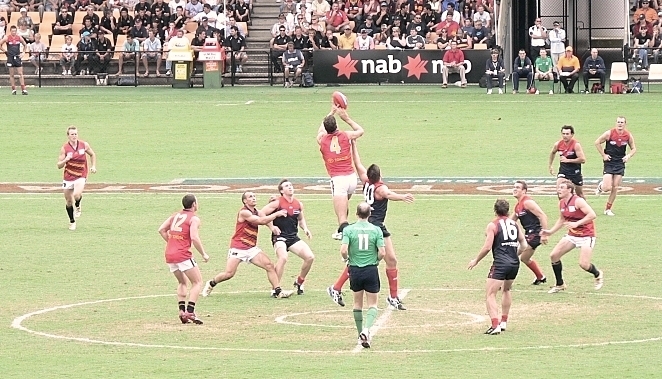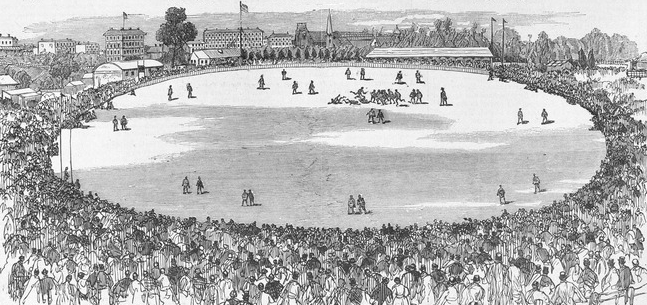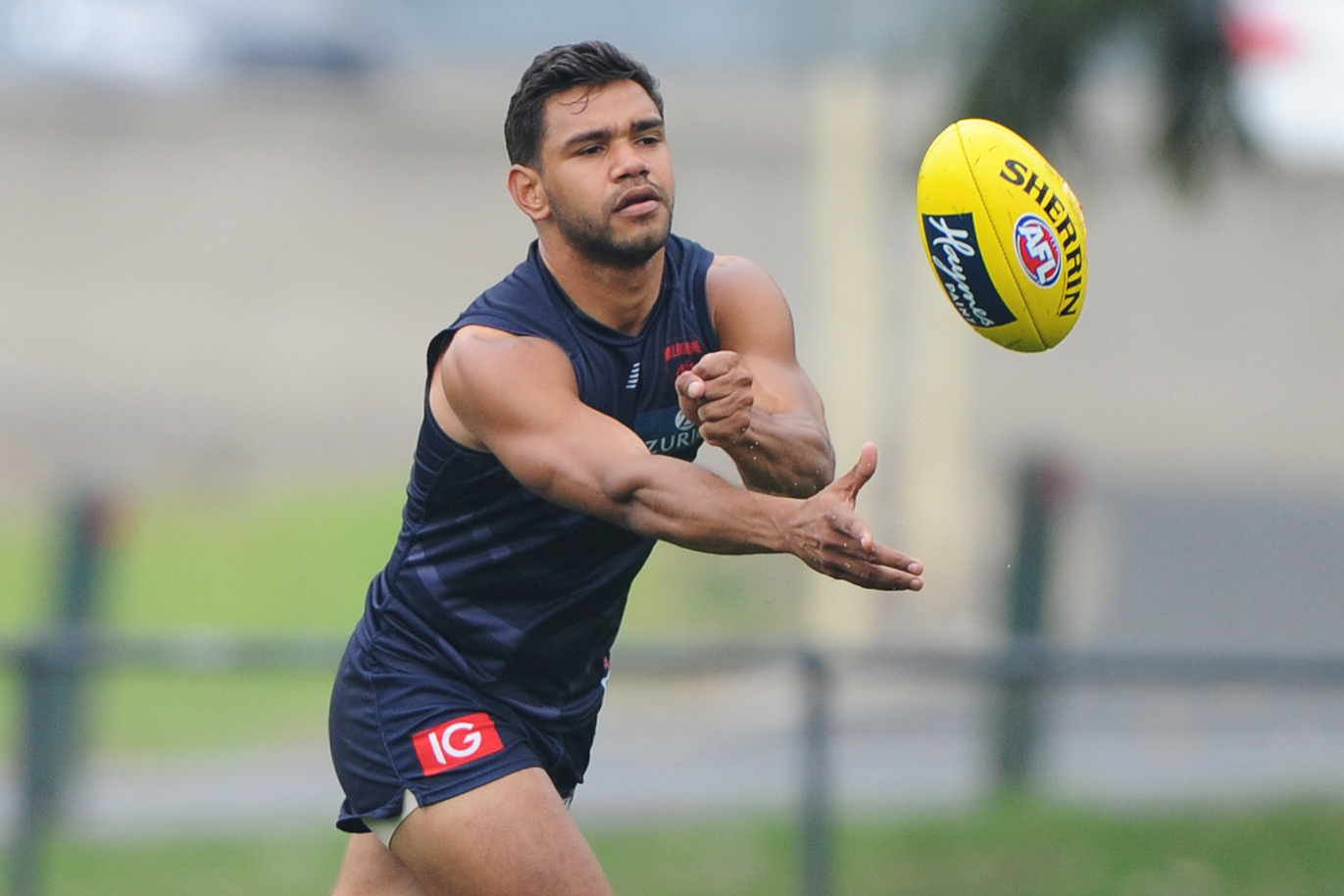|
Eric Tassie
Eric Harry Tassie (12 October 1887 – 21 July 1936) was an Australian rules football administrator. He was president of the Australian National Football Council (ANFC) from 1929 to 1935. Tassie was a son of Henry Tassie, who was a government minister in South Australia."MR. E. H. TASSIE DIES SUDDENLY" ''The Advertiser'', 23 July 1936. He attended , , and played football for the school team and later for various lower-level clubs. An accountant by profession, Tassie became manager of the |
Australian National Football Council
The Australian National Football Council (ANFC) was the national governing body for Australian rules football in Australia from 1906 until 1995. The council was a body of delegates representing each of the principal leagues which controlled the sport in their respective regions. The council was the owner of the laws of the game and managed interstate administrative and football matters. Its function was superseded by the AFL Commission. The council underwent several name changes during its existence, and at different times it was also known as: the Australasian Football Council (1906–1919), the Australian Football Council (1920–1927 and 1973–1975), the National Football League (NFL) (1975–1989) and the National Australian Football Council (NAFC) (1989–1995). Structure and purpose Throughout its history, the ANFC was the top level administrative body for the sport of Australian rules football. In this capacity, it served four main functions: *It was the owner of the of ... [...More Info...] [...Related Items...] OR: [Wikipedia] [Google] [Baidu] |
Laws Of Australian Rules Football
The laws of Australian rules football were first created by the Melbourne Football Club in 1859 and have been refined over the years as the sport evolved into its modern form. The laws significantly predate the advent of a governing body for the sport. The first national and international body, the Australasian Football Council (AFC), was formed in 1905 and became responsible for the laws, although individual leagues retained a wide discretion to vary them. Since 1994, after the establishment of a nation-wide Australian Football League (AFL), the rules for the game have been maintained by the AFL Commission through its AFL Competition Committee. Australian rules football is a contact sport played between two teams of eighteen players on an oval-shaped field, often a modified cricket ground. Points are scored by kicking the oval-shaped ball between goal posts (worth six points) or between behind posts (worth one point). During general play, players may position themselves an ... [...More Info...] [...Related Items...] OR: [Wikipedia] [Google] [Baidu] |
Australian Rules Football Administrators
Australian(s) may refer to: Australia * Australia, a country * Australians, citizens of the Commonwealth of Australia ** European Australians ** Anglo-Celtic Australians, Australians descended principally from British colonists ** Aboriginal Australians, indigenous peoples of Australia as identified and defined within Australian law * Australia (continent) ** Indigenous Australians * Australian English, the dialect of the English language spoken in Australia * Australian Aboriginal languages * ''The Australian'', a newspaper * Australiana, things of Australian origins Other uses * Australian (horse), a racehorse * Australian, British Columbia, an unincorporated community in Canada See also * The Australian (other) * Australia (other) Australia is a country in the Southern Hemisphere. Australia may also refer to: Places * Name of Australia relates the history of the term, as applied to various places. Oceania *Australia (continent), or Sahul, the landmasses ... [...More Info...] [...Related Items...] OR: [Wikipedia] [Google] [Baidu] |
Australian People Of Scottish Descent
Australian(s) may refer to: Australia * Australia, a country * Australians, citizens of the Commonwealth of Australia ** European Australians ** Anglo-Celtic Australians, Australians descended principally from British colonists ** Aboriginal Australians, indigenous peoples of Australia as identified and defined within Australian law * Australia (continent) The continent of Australia, sometimes known in technical contexts by the names Sahul (), Australia-New Guinea, Australinea, Meganesia, or Papualand to distinguish it from the country of Australia, is located within the Southern and East ... ** Indigenous Australians * Australian English, the dialect of the English language spoken in Australia * Australian Aboriginal languages * ''The Australian'', a newspaper * Australiana, things of Australian origins Other uses * Australian (horse), a racehorse * Australian, British Columbia, an unincorporated community in Canada See also * The Australian (other) * ... [...More Info...] [...Related Items...] OR: [Wikipedia] [Google] [Baidu] |
Australian Accountants
Australian(s) may refer to: Australia * Australia, a country * Australians, citizens of the Commonwealth of Australia ** European Australians ** Anglo-Celtic Australians, Australians descended principally from British colonists ** Aboriginal Australians, indigenous peoples of Australia as identified and defined within Australian law * Australia (continent) ** Indigenous Australians * Australian English, the dialect of the English language spoken in Australia * Australian Aboriginal languages * ''The Australian'', a newspaper * Australiana, things of Australian origins Other uses * Australian (horse), a racehorse * Australian, British Columbia, an unincorporated community in Canada See also * The Australian (other) * Australia (other) * * * Austrian (other) Austrian may refer to: * Austrians, someone from Austria or of Austrian descent ** Someone who is considered an Austrian citizen, see Austrian nationality law * Austrian German dialect * Someth ... [...More Info...] [...Related Items...] OR: [Wikipedia] [Google] [Baidu] |
1936 Deaths
Events January–February * January 20 – George V of the United Kingdom and the British Dominions and Emperor of India, dies at his Sandringham Estate. The Prince of Wales succeeds to the throne of the United Kingdom as King Edward VIII. * January 28 – Britain's King George V state funeral takes place in London and Windsor. He is buried at St George's Chapel, Windsor Castle * February 4 – Radium E (bismuth-210) becomes the first radioactive element to be made synthetically. * February 6 – The IV Olympic Winter Games open in Garmisch-Partenkirchen, Germany. * February 10– 19 – Second Italo-Ethiopian War: Battle of Amba Aradam – Italian forces gain a decisive tactical victory, effectively neutralizing the army of the Ethiopian Empire. * February 16 – 1936 Spanish general election: The left-wing Popular Front coalition takes a majority. * February 26 – February 26 Incident (二・二六事件, ''Niniroku Jiken''): The I ... [...More Info...] [...Related Items...] OR: [Wikipedia] [Google] [Baidu] |
1887 Births
Events January–March * January 11 – Louis Pasteur's anti-rabies treatment is defended in the Académie Nationale de Médecine, by Dr. Joseph Grancher. * January 20 ** The United States Senate allows the Navy to lease Pearl Harbor as a naval base. ** British emigrant ship ''Kapunda'' sinks after a collision off the coast of Brazil, killing 303 with only 16 survivors. * January 21 ** The Amateur Athletic Union (AAU) is formed in the United States. ** Brisbane receives a one-day rainfall of (a record for any Australian capital city). * January 24 – Battle of Dogali: Abyssinian troops defeat the Italians. * January 28 ** In a snowstorm at Fort Keogh, Montana, the largest snowflakes on record are reported. They are wide and thick. ** Construction work begins on the foundations of the Eiffel Tower in Paris, France. * February 2 – The first Groundhog Day is observed in Punxsutawney, Pennsylvania. * February 4 – The Interstate Commerce Act ... [...More Info...] [...Related Items...] OR: [Wikipedia] [Google] [Baidu] |
Australian National Football Carnival
Representative matches in Australian rules football are matches between representative teams played under the Australian rules, most notably of the colonies and later Australian states and territories that have been held since 1879. For most of the 20th century, the absence of a national club competition in Australia and international matches meant that intercolonial and later interstate matches were regarded with great importance. Interstate matches were, in most cases, sanctioned and coordinated by the Australian National Football Council (ANFC), which organised every national championship series from the first-ever national carnival, the Jubilee Australasian Football Carnival in 1908 with the exception of the last-ever series: the 1993 State of Origin Championships, which was run by the AFL Commission. The series took place on approximately three-yearly intervals between 1908 and 1993; these were usually a fortnight-long tournament staged in a single host city, although s ... [...More Info...] [...Related Items...] OR: [Wikipedia] [Google] [Baidu] |
Tassie Medal
The Tassie Medal was awarded to the outstanding player at each Australian rules football Interstate matches in Australian rules football, Interstate Carnival or Interstate matches in Australian rules football, Australian interstate championship series held between 1937 and 1988 with the exception of the 1975 knock-out series. The medal is named after Eric Tassie who was a South Australian football administrator who served with distinction on the Australian National Football Council. Unlike with many other such awards, for example the Brownlow Medal, the word 'fairest' was never included in the description, meaning that reported players remained eligible to receive it. Due to the demise of Interstate matches in Australian rules football, State of Origin football there hasn't been a carnival since 1988 hence the reason the award has not since been presented. Tassie Medal Winners References and notes {{Tassie Medal winners Australian rules football awards Australian sport ... [...More Info...] [...Related Items...] OR: [Wikipedia] [Google] [Baidu] |
Mastoid Process
The mastoid part of the temporal bone is the posterior (back) part of the temporal bone, one of the bones of the skull. Its rough surface gives attachment to various muscles (via tendons) and it has openings for blood vessels. From its borders, the mastoid part articulates with two other bones. Etymology The word "mastoid" is derived from the Greek word for "breast", a reference to the shape of this bone. Surfaces Outer surface Its outer surface is rough and gives attachment to the occipitalis and posterior auricular muscles. It is perforated by numerous foramina (holes); for example, the mastoid foramen is situated near the posterior border and transmits a vein to the transverse sinus and a small branch of the occipital artery to the dura mater. The position and size of this foramen are very variable; it is not always present; sometimes it is situated in the occipital bone, or in the suture between the temporal and the occipital. Mastoid process The mastoid process is ... [...More Info...] [...Related Items...] OR: [Wikipedia] [Google] [Baidu] |
Tackle (football Move)
Most forms of football have a move known as a tackle. The primary purposes of tackling are to dispossess an opponent of the ball, to stop the player from gaining ground towards goal or to stop them from carrying out what they intend. The word is used in some contact variations of football to describe the act of physically holding or wrestling a player to the ground. In others, it simply describes one or more methods of contesting for possession of the ball. It can therefore be used as both a defensive or attacking move. Name origin In Middle Dutch, the verb meant to grab or to handle. By the 14th century, this had come to be used for the equipment used for fishing, referring to the rod and reel, etc., and also for that used in sailing, referring to rigging, equipment, or gear used on ships. By the 18th century, a similar use was applied to harnesses or equipment used with horses. Modern use in football comes from the earlier sport of rugby, where the word was used in the 19th ... [...More Info...] [...Related Items...] OR: [Wikipedia] [Google] [Baidu] |
Flick Pass
The Handball or handpass is a skill in the sport of Australian rules football. Throws are not allowed, making the handball the primary means of disposing of the football by hand, and is executed by holding the ball with one hand and punching it with the other. Handball revolutionized the game in the 1980s, moving from the kick and contested mark to the high possession run and carry style that typified the game since. The most prolific handballers in the history of the Australian Football League: Lachie Neale, Greg Williams, Scott Pendlebury, Josh Kennedy and Adam Treloar have averaged more than 13 handballs a game. Skill Handball is a method of disposing of possession of the football by hand. It is the most frequently used alternative to kicking the ball. In order to be a legal method to dispose of the ball, the player holds the ball with one hand and punches the ball away with the clenched fist of the other hand. A player typically punches with his dominant hand, holding th ... [...More Info...] [...Related Items...] OR: [Wikipedia] [Google] [Baidu] |






.jpg)
